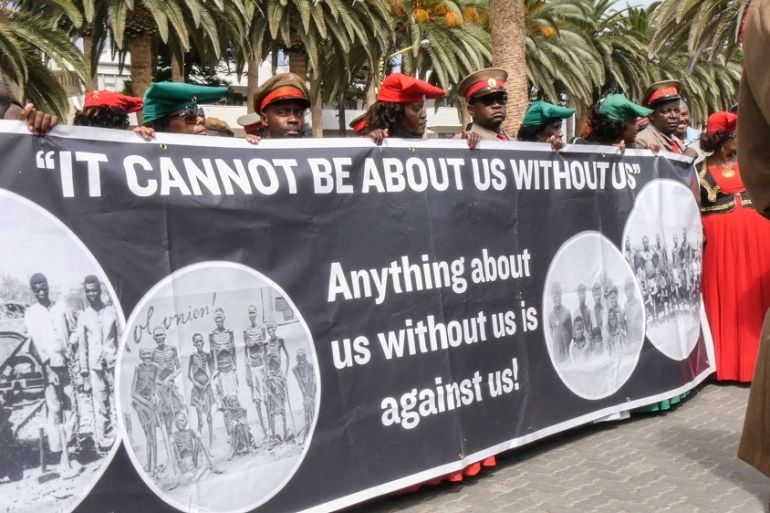‘Betrayal’: Namibian opposition MPs slam Germany genocide deal
Prime minister calls for unity during rowdy parliamentary session but opposition MPs accuse gov’t of sidelining them and the communities directly affected.

Opposition politicians in Namibia have slammed the government’s deal with Germany as legislators in Windhoek began debating the
planned reconciliation agreement under which Berlin officially acknowledged an early 20th-century genocide by colonial troops and agreed to a $1.3bn settlement.
The funds – which would go into development projects – are meant to be distributed across a 30-year period.
Keep reading
list of 4 itemsWhere Rwanda’s genocide perpetrators and survivors live side by side
ICJ updates: Nicaragua’s case against Germany over Israel’s war on Gaza
The judicial legacy of the Rwandan genocide: 30 years of double standards
Prime Minister Saara Kuugongelwa-Amadhila opened Tuesday’s rowdy parliamentary debate by outlining details of the agreement.
“This issue is indeed a sensitive one,” she said, her calls for unity interrupted by heckling from members of parliament.
“It is important that we do not become divided over this issue, but remain united as a nation in pursuing it until its logical conclusion,” she said.
But opposition politicians took turns denouncing the deal, accusing the government of sidelining them and the communities directly affected by the genocide during negotiations that reached an agreement last month.
“They have excluded communities, groups of Namibians … that is apartheid that government has practised,” Edson Isaacks, from the opposition Landless People’s Movement Namibia (LPM), describing the result of the dealmaking process as a “substandard agreement”.
Another LPM lawmaker, Utaara Mootu told Kuugongelwa-Amadhila, “You have betrayed us”.
“You have not allowed for equal participation based on human rights policies. You have not given us the chance to narrate the economic trauma” caused by the genocide, she added.
The deal needs to be ratified by both the Namibian and German parliament, after which it will be signed by the two countries’ foreign ministers.
Josef Kauandenge, leader of another opposition party, the National Unity Democratic Organisation (NUDO) declared, “We will not be party to any signatory for things that we did not participate” in.
“That agreement can be signed between the Germany and the Namibian government, but the vast majority of Nama and Ovaherero people will reject it with the contempt it deserves,” said Kauandenge.
The prime minister insisted that the affected communities were “fully consulted during the negotiations”.
However, descendants of the affected communities said they were not included in the process. They have demanded that reparations be paid to their communities directly.
Last week, Namibia’s Vice President Nangolo Mbumba said the development budget offered by Germany as compensation for the genocide was “not enough” but would be revisited as funding is rolled out.
The German Empire conquered what is now Namibia and used it as a colony between 1884 and 1915, treating the populace brutally.
The southern African country’s government started negotiations with its former coloniser Germany in 2015 over the 1904-1908 massacre of Herero and Nama people for rebelling against their rulers.
Historians say some 65,000 of the 85,000 Herero and at least 10,000 of the 20,000 Nama living there at the time were killed.
After years of back and forth, the parties reached a landmark agreement last month in which Germany officially recognised the killings as a genocide.
Kuugongelwa-Amadhila said the German government has agreed to “render an unconditional apology to the affected communities” and the country as a whole for the genocide.
The apology will be delivered by the German president in the National Assembly on a yet-to-be-decided date.